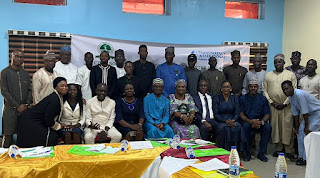Curbing Infant Deaths Through Improved Nutrition, Immunisation, Others In Oyo
Chioma Umeha
With improved nutrition, including proper
breastfeeding practices, immunisation and health delivery system, experts have
said that high infant and neo-natal deaths in the country would be curbed.
The experts, who spoke at a just concluded media
dialogue in Ibadan, with the theme ‘Improving Health Outcomes for Children in
Oyo State through Accelerated Action for Impact,’ noted that the method is
yielding positive health outcomes among children Oyo state.
One of them, Dr Adebola Hassan, the United Nations
Children Fund (UNICEF) Health Specialist, Akure Field Office, said UNICEF was
engaging in various intervention programmes to assist the state in minimising
the high prevalence of death of newborns in the state.
She said due to poor nutrition, improper
breastfeeding, lack of immunisation and poor delivery system, among others,
many newborn children had lost their lives in the state.
Hassan said that Ibadan North-East, Ibarapa North
and Saki West Local Government Areas were among the six Local Governments in
the state with highest infant mortality and neo-natal death in the state.
She said with various interventions by UNICEF in
partnership with the state government, the trend was changing.
During a field trip to Ibadan North-East Primary
Healthcare Centre (PHC), medical personnel, pregnant women and community
leaders commended UNICEF and state government for their various interventions
in saving lives of newborns in the area.
Mrs Jolasinmi Adebola, the Chief Community Health
Extension Worker, said that through various interventions such as counselling
and awareness, the number of women who usually brings their children for
immunisation had increased.
Adebola said due to intervention by UNICEF and
state government, the number of women who usually bring their newborns for
immunisation had increased from 56 on a monthly basis to 78.
She added that the number of women who practised
exclusive breastfeeding had also increased from 103 to 189.
Adebola said all these intervention programmes had
been having positive effects on minimising the number of newborn deaths in the
council area.
Earlier, Mr. Ayobami Akinola, the Assistant
Immunisation Coaching Officer for the LGA, said the number of newborns
immunised on a monthly basis had increased from 1,701 to 1,926 due to health
interventions.
Ayobami said women were being taught on proper
immunisation, exclusive breastfeeding and post-natal services, among others.
He said ward development community were also
established to disabuse the mind of people on negative belief on immunisation.
Ayobami said PHC had solar refrigerator and cold
boxes to preserve the vaccines before distribution to other PHCs in the area.
Contributing, Blessing Ejiofor, UNICEF’s Media
Officer, solicited media support on accurate and informed report on preventable
child death in Nigeria.
Ejiofor said that dialogue was meant to provide
the media with the knowledge and materials to support informed media advocacy
on preventable child death.
“Accelerated action impact initiative, as a game
changer, to fast-track reduction of preventable child death in Nigeria,’’ she
said.
Ejiofor said that the expected outcome of the
programme was to see media producing, publishing and airing accurate and
informed stories and reports on preventable child death.
The UNICEF’s Media Officer said the essence was to
draw the government’s attention to the need to scale up action in order to
reverse the ugly trend of death of newborn.
Also, Dr Khadijat Alarape, the Oyo State Nutrition
Officer, said that lack of proper breastfeeding had led to the death of many
newborns.
Alarape said that many mothers failed to
breastfeed their children immediately after birth, which she said led to the
death of many newborns in the state.
She said that rather than give breast milk to
newborns, many mothers were involved in giving concoctions or herbs to their
babies at birth.
Alarape said that some mothers, due to believe
that their nipples would ‘sag’ if they breastfeed, had also neglected
breastfeeding.
She urged mothers to ensure proper placement
of their newborns’ mouth on the
‘areola,’ the dark portion of breast and not the nipples to enable the baby to
suck properly.




Comments
Post a Comment